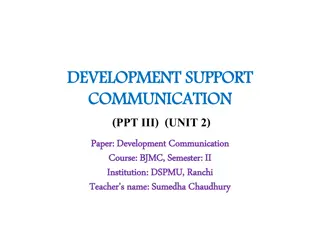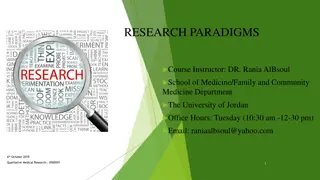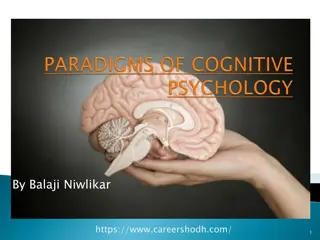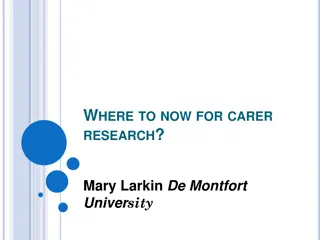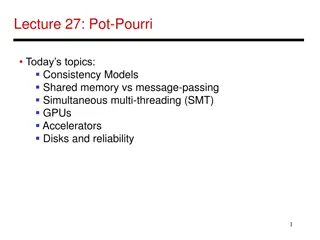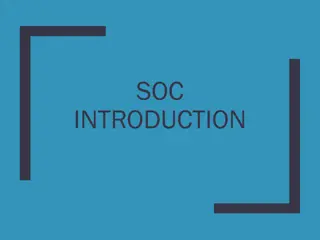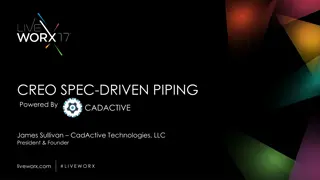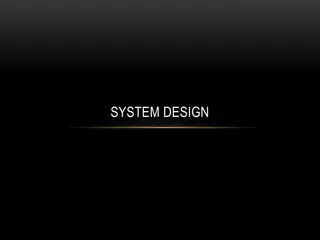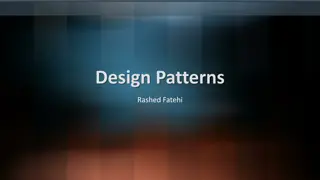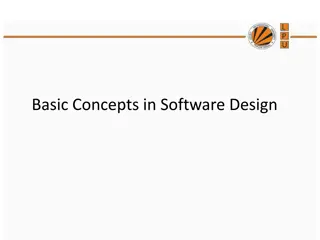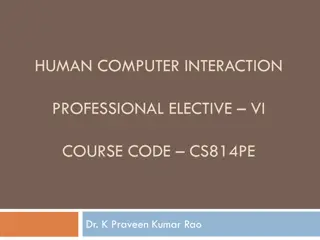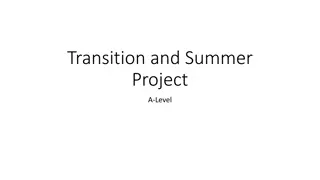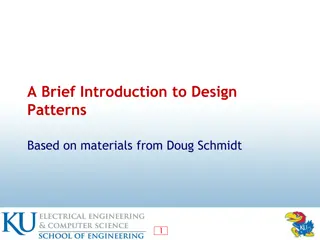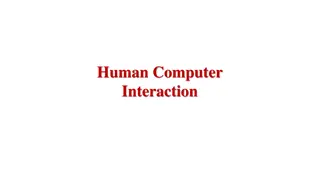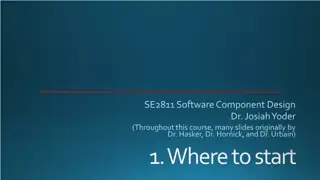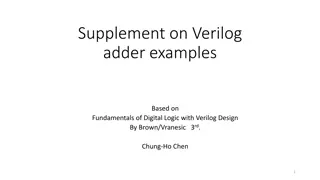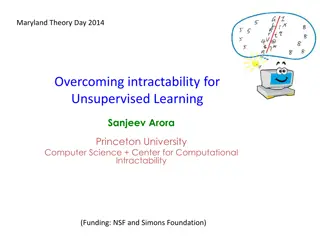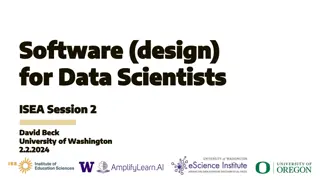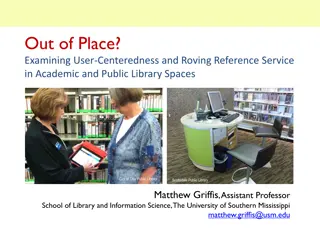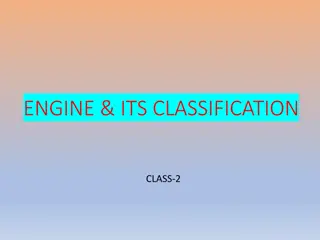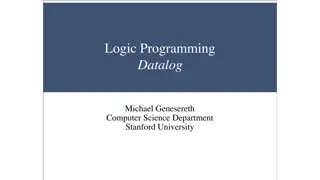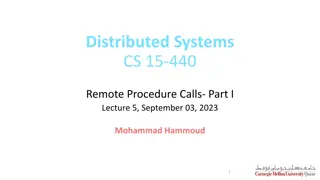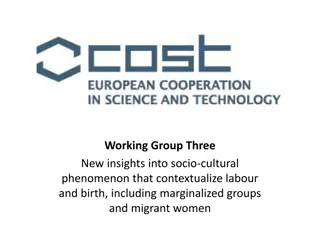Enhancing Academic Freedom in Curriculum
Explore academic freedom's role in creating inclusive learning environments by challenging traditional paradigms. Join discussions on curriculum's relationship to academic freedom and fostering student belonging in higher education spaces.
1 views • 41 slides
Entrepreneurship Master Class at the University of Bejaia: Concepts and Processes
This Entrepreneurship Master Class at the University of Bejaia, part of the Ci-RES project (Erasmus+), focuses on developing students' initiative and entrepreneurial spirit. Topics include entrepreneurial paradigms, characteristics of entrepreneurs, the entrepreneurial process, financing, and legal
2 views • 35 slides
Understanding Software Analysis and Design Process
Software analysis and design involve a systematic approach to understanding user requirements, creating logical models, and transitioning to detailed design specifications. Requirements analysis focuses on capturing system requirements, while design translates these requirements into implementation
7 views • 16 slides
Evolution of Development Communication Paradigms and Alternative Paradigm
Development Communication explores the stages of creating a plan, implementing strategies, and ownership paradigms in development projects. Emphasis is on participatory approaches, community empowerment, and inverting top-down processes. The concept of Alternative Paradigm emerges to counter the ali
0 views • 6 slides
Guidelines for Design of Cement Concrete Pavement and Interlocking Paver Blocks
This document provides guidelines for designing cement concrete pavements and interlocking paver blocks, covering factors governing design, wheel loads, design period, subgrade characteristics, approximate k values based on CBR values, and the importance of a sub-base below concrete pavements. It em
0 views • 67 slides
Understanding Research Paradigms in Qualitative Medical Research
Delve into the world of research paradigms in qualitative medical research with a focus on the key differences between objective and subjective research, the meaning of research paradigms, components of research paradigms, types of research paradigms, and how paradigms guide the selection of researc
0 views • 42 slides
Qualitative vs. Quantitative Approaches in Health Research
Exploring the different methodologies, paradigms, and methods used in health research, this content highlights the distinction between qualitative and quantitative designs. It covers research questions, aims, objectives, hypotheses, and various quantitative approaches such as experimental and observ
1 views • 28 slides
Exploring Paradigms of Cognitive Psychology
Cognitive psychology, a branch of psychology, delves into mental processes like thinking, perceiving, remembering, and learning. This field views individuals as information processors, with paradigms guiding research methodologies. Key approaches include Information Processing, Connectionist, Evolut
0 views • 18 slides
Software Engineering Design Principles and Concepts
The chapter discusses the essential principles and concepts in software design, highlighting the four key design models - data design, architectural design, interface design, and component-level design. It emphasizes the importance of traceability to the analysis model, minimizing the gap between so
0 views • 36 slides
APL - A Functional Language with Array Paradigms
APL, named after the book "A Programming Language Paradigms," is a functional language with a focus on array manipulation. Developed in the 1960s by Kenneth E. Iverson, it has had a significant impact on the development of spreadsheets and computer math packages. APL operates with chains of monadic
0 views • 11 slides
Innovations in Social Work Research: Emerging Topics and Paradigms
Explore the latest trends in social work research at the 2016 Joint World Conference on Social Work, Education, and Social Development. Discover topics such as global change, indigenous concerns, and migration issues. Delve into research paradigms, methodologies, and challenges, including the impact
0 views • 8 slides
Implementing Strategic Areas for Non-Communicable Disease Prevention
Implementation of national prevention and control programs for non-communicable diseases is crucial for sustainable healthcare systems. Collaborating with multidisciplinary groups and shifting advocacy paradigms towards human rights and social determinants of health are essential. A transformation i
1 views • 20 slides
Exploring Carer Research Trends in the UK: A Critical Analysis
Research conducted at De Montfort University explores the evolution of carer research paradigms in the UK since 1995, aiming to critique the relationship between research/theory and our understanding of carers. Through multi-stage reviews and analysis, the study delves into key dimensions of carer r
0 views • 26 slides
Understanding Memory Consistency Models and Communication Paradigms in Computer Systems
Memory consistency models define the ordering of writes and reads in computer systems. Coherence ensures write propagation and serialization, while consistency models guide programmers in writing correct programs. Shared-memory and message-passing are two communication paradigms with different appro
0 views • 31 slides
Understanding System on Chip (SoC) Design and Components
Explore the world of System on Chip (SoC) design, components, and working flow. Learn about Intellectual Properties (IP), platform-based design, typical design flows, top-down design approach, and the emerging Electronic System Level (ESL) design flow. Discover the essential components of an SoC, su
0 views • 45 slides
Exploring Design Inspiration and Elements in Costume and Fashion Design
Dive into the world of costume and fashion design through a visual journey of finding design inspiration, understanding the design process, emphasizing originality, and exploring different sources of creativity. Discover how technology, art, food, history, architecture, and nature can spark innovati
0 views • 45 slides
Enhancing Piping Design Efficiency with Spec-Driven Technology
Explore how Spec-Driven Piping technology powered by CADACTIVE offers a standardized approach for piping design in Creo Parametric. This innovative extension streamlines design communication, eliminates errors, and improves design efficiency by utilizing a master catalog, automated checking capabili
0 views • 15 slides
Material Design: Combining Classic Design Principles with Technological Innovation
Material Design is a design language that combines traditional design principles with the possibilities offered by technology and science. It emphasizes visual language, classic design elements, and innovation to create delightful user experiences. The Material Metaphor, Imagery, Typography, Color,
0 views • 34 slides
Comprehensive Guide to System Design Components and Techniques
System design involves the detailed planning and identification of components in an information system, aiming to provide users with a general understanding of the new system. This process includes techniques like flowcharts, prototyping, and component design, covering aspects such as output design,
0 views • 24 slides
Understanding Design Patterns: A Comprehensive Overview
Exploring the world of design patterns, this content delves into the essence of design patterns, their application in software design to resolve complexity, and the different types of design patterns - creational, structural, and behavioral. It also showcases examples of popular design patterns such
0 views • 22 slides
Understanding Basic Concepts in Software Design
Software design involves transforming customer requirements into a form suitable for implementation, with activities categorized into preliminary and detailed design stages. High-level design focuses on module identification and control relationships, while detailed design entails defining data stru
1 views • 24 slides
Overview of Human-Computer Interaction Course
Gain insight into Human-Computer Interaction (HCI) by understanding user interface design, alternative computing methods, cognitive psychology models, ethical responsibilities, and team-work experience. Explore conventional and non-traditional interface paradigms, design tools for accessibility, and
0 views • 108 slides
Exploring 3D Design and Critical Analysis in Architecture
Dive into the world of 3D design and critical analysis with a focus on architecture. Discover the stages of design, essential skills for designers, and areas of study in three-dimensional design. Delve into iconic buildings like Frank Lloyd Wright's Falling Water, analyze their key features, and eve
0 views • 9 slides
Top Ten All-Time Stupid Quotes
Explore a collection of historical quotes demonstrating misguided predictions and beliefs, from dismissing the need for computers to doubting the significance of inventions like the telephone and moon landing. Reflect on the impact of self-paradigms and paradigms of others as discussed in the text,
0 views • 12 slides
Understanding Design Patterns in Object-Oriented Design
Design patterns in object-oriented design (OOD) are essential templates that codify best practices for solving common problems. They help streamline development by capturing proven design decisions, promoting code reuse, and enhancing system flexibility and modularity. Learn about the core concepts,
0 views • 20 slides
Exploring Computer Programming Principles
Dive into the world of computer programming, covering high-level and machine languages, compilers, interpreters, writing programs, top-down design, and the array of programming languages available. Understand the essentials of building code to control computers, the diversity of programming language
0 views • 23 slides
Understanding Interaction Design in Human-Computer Interaction
Interaction design focuses on creating interactive products that are easy, effective, and enjoyable to use. It aims to reduce negative user experiences while enhancing positive ones. Designing interactive products requires understanding user activities, interfaces, and device arrangements to support
0 views • 11 slides
SE2811 Software Component Design Overview
This course covers software component design, design patterns, object-oriented design, algorithms, and opportunities for reuse in systems design. It emphasizes the importance of domain-level design and provides insights into solving core problems through reusable classes.
0 views • 21 slides
Analysis of Bunch Lengthening in CEPC for Different Design Parameters
This study explores bunch lengthening in the Circular Electron Positron Collider (CEPC) for various design parameters, analyzing a 54 km design scheme, a 61 km design scheme, and a 100 km design scheme. The analysis includes the theoretical framework used, equations for bunch lengthening, and conclu
1 views • 15 slides
Understanding Plain & Reinforced Concrete Structures in Design Engineering
In the design of Plain & Reinforced Concrete structures, various strength design methods such as Ultimate Strength Design (USD) and Allowable Strength Design (ASD) are utilized. These methods involve factors of safety, material strength, load factors, and analysis in the elastic range. Additionally,
0 views • 11 slides
Verilog Adder Examples & Typical IC Design Flow
This comprehensive content delves into Verilog adder examples, typical IC design flow, physical design considerations, and examples of OpenGL ES GPU and ARM hypervisor applications. It covers the fundamentals of digital logic with Verilog design, hardware description language, FPGA prototyping, phys
0 views • 27 slides
Understanding Hebrew Verb Forms: Qal Qatal and Piel Qatal Paradigms
Explore the rules and nuances of using definite articles with prepositions, verb forms, and verb charts in Hebrew. Learn how to identify and read the Qal Qatal and Piel Qatal paradigms, and understand the significance of prepositions with the definite article. Dive into verb charts for Qatal and dec
0 views • 25 slides
Unsupervised Learning Paradigms and Challenges in Theory
Explore the realm of unsupervised learning as discussed in the Maryland Theory Day 2014 event. Overcoming intractability for unsupervised learning, the distinction between supervised and unsupervised learning, main paradigms, NP-hardness obstacles, and examples like the inverse moment problem are co
0 views • 38 slides
Understanding the Importance of Software Design for Data Scientists
Today's ISEA Session 2 with David Beck from the University of Washington delves into the critical role of intentional software design for data scientists. The session covers the software design approach, user-centric design stories, use cases, components, testing strategies, and the benefits and dra
0 views • 76 slides
Roving Reference Service and User-Centeredness in Library Spaces
Examining the impact of roving reference service models on traditional library paradigms regarding user-centeredness and space design. The study explores how modern library practices challenge established relationships, utilizing a user-centric approach to redefine spatial interactions within librar
0 views • 14 slides
Understanding Engine Classification and Design
Engine classification involves categorizing engines based on various factors such as combustion type, number of strokes, cylinder design, and ignition method. Common classifications include external and internal combustion engines, as well as categories based on the design and use of the engine. Add
0 views • 11 slides
Challenges and Opportunities in Computer Architecture Future
Robert Colwell discusses the evolving landscape of computer architecture research, highlighting the shift towards focusing on power efficiency, system complexity, and holistic design considerations. He emphasizes the importance of transcending traditional paradigms and incorporating a multi-faceted
0 views • 9 slides
Unraveling the Complexities of Hex Game Encoding Paradigms
Hex, a strategic two-player game invented by John Nash and Piet Hein, poses intriguing challenges for mathematicians and computer scientists. This article delves into different paradigms for encoding Hex game rules, exploring the performance of each. From basic observations to advanced approaches li
0 views • 20 slides
Distributed Systems: Remote Procedure Calls and Communication Paradigms
Explore the fundamentals of distributed systems, focusing on remote procedure calls, communication paradigms, and middleware layers. Learn how entities communicate in distributed systems, classification of communication paradigms, and the role of middleware in facilitating communication between appl
0 views • 28 slides
New Insights into Socio-Cultural Phenomenon Contextualizing Labour and Birth
Explore the socio-cultural aspects of labour and birth, focusing on marginalized groups and migrant women. The project spans four years, with aims to establish scientific paradigms, conduct systematic reviews, explore funding opportunities, and design implementation studies. Sub-working groups delve
0 views • 36 slides



